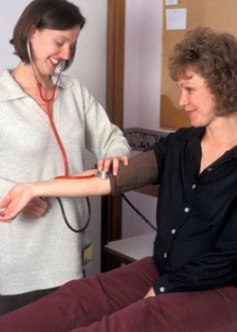Pregnancy induced hypertension (PIH) is a form of high blood pressure in your pregnancy.
This condition occurs in about 5-8% of all pregnancies. PIH is also called as pre eclampsia or toxemia.
Pregnancy induced hypertension is the condition that most commonly occurs in younger women with their first pregnancies.
This condition is also seen in women who have chronic hypertension, diabetes, PIH in their first pregnancy and in twin pregnancies.
Mainly, pregnancy induced hypertension has three main characteristics. They include:
- High blood pressure i.e. blood pressure greater than 140/90 mm Hg
- Edema, also called as swelling of the ankles and feet
- Protein in the urine
Eclampsia is the most severe type of pregnancy induced hypertension. Eclampsia results in seizures in a pregnant woman.
Who are at risk of pregnancy induced hypertension?
Women with the following conditions are at high threat of developing pregnancy induced hypertension.
- First time mother
- If you have sisters or mothers with PIH
- Carrying multiple pregnancies
- Women who are pregnant at the age of 40
- Teenage mothers
- If you have kidney disease or high blood pressure before becoming pregnant
What are the effects of pregnancy induced hypertension?
Mild symptoms include: Water retention, protein in your urine and high blood pressure
Severe symptoms include: Blurred vision, headaches, unable to tolerate the bright light, vomiting/nausea, pain in your upper right tummy, affinity to bruise easily, fatigue, shortness of breathe, and urinating in smaller amounts. Immediately contact your health care provider if you notice any of the above conditions.
How to treat pregnancy induced hypertension?
Treatment for pregnancy induced hypertension is mainly based on how near you are to the due date. If the due date is closer and the baby is well developed, then your practitioner suggests you for immediate delivery.
If you have mild PIH and the baby is not well developed, then your practitioner will suggest you to do the following things:
- Frequent prenatal tests and checkups
- Consuming less salt diet
- Drinking 8-10 glasses of water each day
- Taking plenty of rest and sleeping on the left side to remove the weight of your baby from main blood vessels
If you are suffering with severe PIH, your doctor recommends you to use medications to control the blood pressure until you deliver the baby safely.
How does pregnancy induced hypertension affect your baby?
This condition prevents the placenta from receiving enough blood. If there is improper supply of blood, then your baby receives less food and oxygen. Finally this can lead to lower birth weight.
Early detection of PIH and getting regular prenatal checkups make you to still deliver a healthy baby.
How to prevent the condition of pregnancy induced hypertension?
Identifying PIH early decreases the risk and it helps to prevent some of the complications of the PIH. Know about the warning signs as much as you can so that you can easily recognize the condition and take necessary treatment for preventing the worsening of the disease.






